Politics
Tech war: China advocates use of local AI chips over those from US powerhouse Nvidia
Published
4 months agoon
By
Ekwutos BlogAI chip users on the mainland have been informally advised to prioritise local alternatives, including those from Huawei, sources say
Chinese authorities have informally advised local companies to use domestic-made artificial intelligence (AI) chips over those from Nvidia, according to two sources familiar with the matter, as alternative suppliers on the mainland look to catch up with the US tech giant.
While there is no official ban on Nvidia’s China-tailored H20 graphics processing unit (GPU), the sources said mainland AI chip users have been informed to prioritise deployment of local alternatives, including those developed by Huawei Technologies.
A third source said H20 orders made by mainland enterprises had not been restricted as of August.
Do you have questions about the biggest topics and trends from around the world? Get the answers with SCMP Knowledge, our new platform of curated content with explainers, FAQs, analyses and infographics brought to you by our award-winning team.
Reports about China’s tacit rules against the American chip design firm first emerged in May, when US tech media The Information reported that regulators had asked local companies to cut back purchases of Nvidia chips and buy more from domestic suppliers like Huawei. A Bloomberg report last week said that China has called on local buyers to stay away from Nvidia.
The country’s Ministry of Industry and Information Technology, which oversees the domestic semiconductor and AI sectors, has not made any public announcement regarding that matter. The agency did not reply to a request for comment.
Nvidia did not also respond to a request for comment on the reported China restrictions.
The lack of any official confirmation about the matter somehow reflects the highly sensitive nature of the world’s AI chip market, which Taiwan Semiconductor Manufacturing Co chief executive Hsu Ming-chi has projected to grow annually at a much higher rate than the overall semiconductor industry.
When asked about his views on US trade restrictions on China, Nvidia chief executive Jensen Huang told American media in Washington on September 28 that the US government is “doing a wonderful job” in finding the right balance between controls and exporting American technology to the world.
“It is really terrific that the world is built on American standards,” Huang said, “Nvidia is an American company and our government and administration would love to see us succeed.”
Nvidia’s H20 remains popular among users in China, despite its reduced capacity to comply with US sanctions. Sales of the tailor-made chip have steadily picked up since its release earlier this year, as demand from large Chinese cloud services providers enabled them to access Nvidia’s technical support and maintenance services.
Nvidia is expected to deliver more than 1 million H20 GPUs in China this year, racking up US$12 billion in sales.
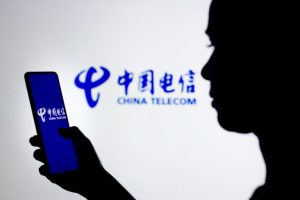
State-owned China Telecom is a major user of domestic-made artificial intelligence chips. Photo: Shutterstock
Still, adoption of alternative Chinese-made AI chips is growing.
State-owned carrier China Telecom, for example, said in a statement on September 28 that it has developed two large language models – the technology behind generative AI applications like ChatGPT – that were trained entirely on locally produced AI chips. While it did not identify the local supplier, China Telecom has a track record of partnering with Huawei.
A week earlier, Huawei had started offering samples of its Ascend 910C processor to large Chinese server companies for hardware testing and configuration, according to a South China Morning Post report. That put the company a step closer to the commercial roll-out of its upgraded version of the 910B, which is on par with Nvidia’s popular A100 chips.
Nvidia was initially barred from selling its A100 and H100 GPUs – two of the most in-demand chips for training and running AI models – to clients in China in August 2022. It later modified those chips to create the A800 and H800 to get around those restrictions, which Washington barred from being exported to China under tightened curbs announced last October.
Nvidia has since developed the H20, L20 and L2 GPUs to maintain its market share in China. Despite several rounds of US restrictions, Nvidia said China was its third-largest market in its financial year ended January 28.
More Articles from SCMP
Port workers’ protest against automation will only hurt US competitiveness
Write a funny caption for this woman having some fun at an art exhibit
Replicas of Kowloon Walled City film sets to be exhibited at Hong Kong airport
Sky’s the limit as Hong Kong enters the space age
This article originally appeared on the South China Morning Post (www.scmp.com), the leading news media reporting on China and Asia.
You may like


Nigerian woman cries out after allegedly being brut@lised by her husband for ‘wearing singlet to take their children to school’


Niger Explosion: Governance must prioritize human lives through proactive policies – Peter Obi


What Speed Darlington posted on Instagram after release from prolonged detention
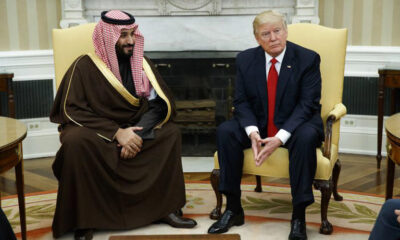

Saudi crown prince says kingdom intends to invest billions in US during call with Trump


The 10 most valuable left-backs in world football in 2025: Calafiori, Gvardiol, Balde…


Abia Govt Begins Major Crackdown On Street Trading, Road Obstructions In Aba
Politics
Niger Explosion: Governance must prioritize human lives through proactive policies – Peter Obi
Published
15 hours agoon
January 23, 2025By
Ekwutos Blog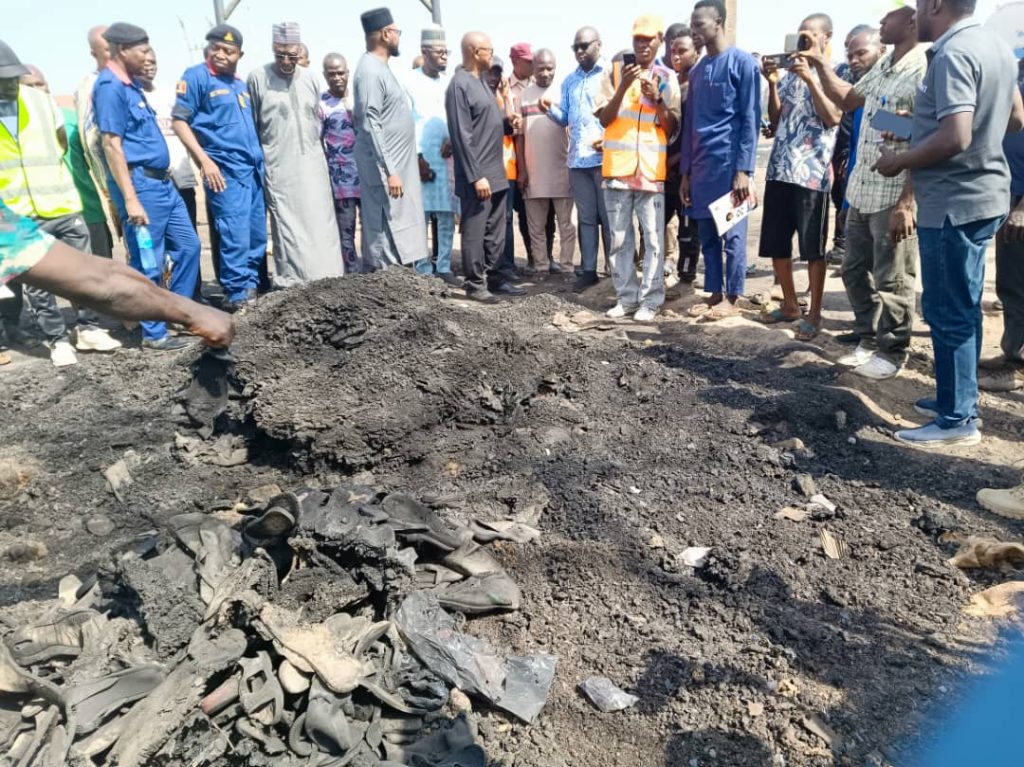
Peter Obi, former governor and 2023 presidential candidate, has called for urgent safety measures to prevent recurring disasters like the tragic petrol tanker explosion that claimed over 100 lives in Suleja, Niger State.
Obi made this appeal during his visit to the site of the explosion, the gravesite, and the Sarkin Dikko palace along the Dikko-Maje Road.
“Today, emotion took the greater part of me as I left Lagos this morning and headed to the site of the tragic petrol tanker explosion, the gravesite, and also the Sarkin Dikko place along the Dikko-Maje Road in Suleja, Niger State, where over 100 lives were lost, more than 50 injured, and many properties destroyed,” Obi shared on his official X handle on Wednesday.
At the explosion site and the graveyard, where 80 victims were buried, Obi expressed sorrow over the preventable tragedy.
He also visited some of the injured victims at the hospital, offering them support and encouragement.
“These recurring disasters call for urgent safety measures: repairing roads, more enlightenment of tanker vehicle operators, investing in healthcare, and lifting people out of poverty to prevent such heartbreaking losses,” he added.
Obi extended his condolences and solidarity to the Dikko community during his meeting with Sarkin Dikko and his council.
He revealed the importance of proactive governance to safeguard human lives.
“Human lives are invaluable, and governance must prioritize their protection through proactive policies,” he stated.
“Together, we can ensure such tragedies become a thing of the past,” he said.
Politics
Saudi crown prince says kingdom intends to invest billions in US during call with Trump
Published
16 hours agoon
January 23, 2025By
Ekwutos Blog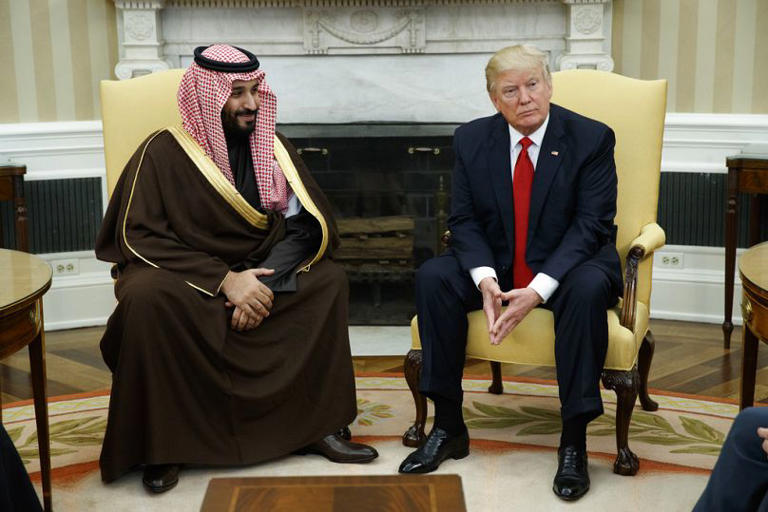
Saudi Arabia’s crown prince said on Thursday that the kingdom wants to invest $600 billion (€576 billion) in the United States over the next four years after a phone call with US President Donald Trump.
Crown Prince Mohammed bin Salman’s comments come after Trump mused about returning to Saudi Arabia as his first foreign trip back in office.
State-run Saudi Press Agency said, “the crown prince affirmed the kingdom’s intention to broaden its investments and trade with the United States over the next four years, in the amount of $600 billion (€576 bn), and potentially beyond that.”
The agency did not elaborate on exactly how the money would be spent.
During their conversation, the two also reportedly discussed ways the two countries could cooperate to establish peace, security and stability in the Middle East.
There was no immediate response from the White House regarding the call. It also wasn’t clear whether Trump’s call with the crown prince was his first with a foreign leader since returning to the Oval Office.
However, it was his first reported abroad.
Trump’s relationship with Saudi Arabia
After his inauguration, Trump talked about the possibility of heading to the kingdom again as his first foreign trip, like he did in 2017.
“The first foreign trip typically has been with the UK but… I did it with Saudi Arabia last time because they agreed to buy $450 billion (€429 bn) worth of our products,” Trump told journalists in the Oval Office.
“I think I’d probably go (again),” the recently inaugurated leader said.
In recent years, the US has increasingly pulled away from relying on Saudi oil exports — once the bedrock the relationship between the two nations.
Trump maintained close relations with Saudi Arabia, even after the crown prince was embroiled in controversy after he was implicated in the 2018 murder of Washington Post columnist Jamal Khashoggi in Istanbul.
The billion dollar pledge, which dwarves the gross domestic product of many nations, comes as the kingdom faces budgetary pressures of its own. Global oil prices remain depressed years after the height of the coronavirus pandemic, affecting the kingdom’s revenues.
Meanwhile, the crown prince has continued to invest in NEOM, a new city in the Saudi Arabian desert. The country also needs to build tens of billions of dollar’s worth of new stadiums and infrastructure ahead of the 2034 FIFA World Cup, which it is hosting.
Politics
Zelensky dampens hopes Trump could strike peace deal with Putin
Published
1 day agoon
January 22, 2025By
Ekwutos Blog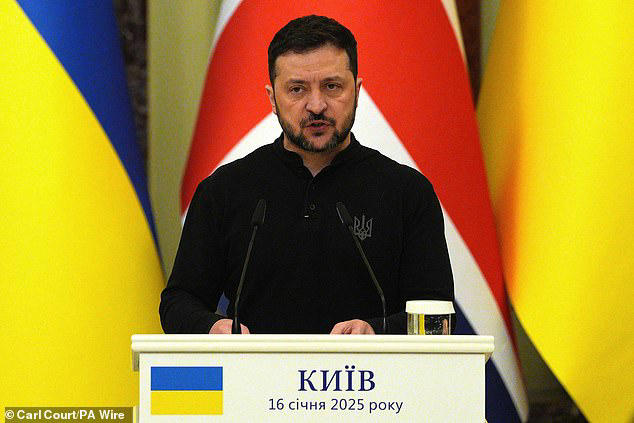
Volodymyr Zelensky has insisted that Ukraine will never recognise occupied Ukrainian territories as being part of Russia, even if pressured to do so by allies, dampening hopes that Donald Trump may be able to strike a peace deal.
‘No matter what anyone wants, even if all the allies in the world unite, we will never recognise the occupied territories [as part of Russia]. This is impossible,’ the Ukrainian president emphasised.
‘We will not legally recognise them. For us, they will always remain occupied territories until we liberate them.’
Trump, who took office for a second term on Monday and was last in power before Russia launched its full-scale invasion of Ukraine, has repeatedly said he could end the war swiftly, without specifying how.
His newly-appointed Secretary of State Marco Rubio said on Tuesday that ending the war was a priority for the president, but would only be possible if both sides make significant concessions.
‘Anytime you bring an end to a conflict between two sides, neither of whom can achieve their maximum goals, each side is going to have to give up something,’ he told CNN, adding that ultimately the decision would be down to the Ukrainians and Russians.
It comes after Russian Deputy Foreign Minister Sergei Ryabkov said today that Moscow sees a small window of opportunity to forge agreements with the new US administration.
‘We cannot say anything today about the degree of the incoming administration’s capacity to negotiate, but still, compared to the hopelessness in every aspect of the previous White House chief (Joe Biden), there is a window of opportunity today, albeit a small one,’ Ryabkov said, according to Interfax.
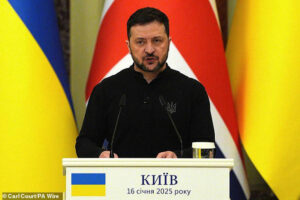
Volodymyr Zelensky has insisted that Ukraine will never recognise occupied Ukrainian territories as being part of Russia
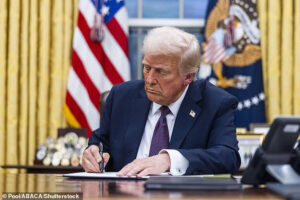
Donald Trump, who took office for a second term on Monday, has said he could end the war swiftly, without specifying how
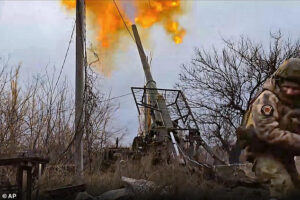
A Russian soldier fires a self-propelled gun
‘It’s therefore important to understand with what and whom we will have to deal, how best to build relations with Washington, how best to maximise opportunities and minimise risks,’ he said, speaking at the Institute for US and Canadian Studies, a think-tank in Moscow.
Trump warned on Tuesday that he would likely impose more sanctions on Russia if President Vladimir Putin refused to negotiate to end the nearly three-year-old conflict.
He gave no details on the possible additional sanctions on Russia, which is already under significant Western sanctions over the war.
The new president also issued a blow to the Kremlin on Tuesday, accusing Putin of ‘destroying Russia‘ with his failed war as he urged him to ‘make a deal’ to end the conflict.
‘He has to make a deal. I think he is destroying Russia by not making a deal,’ Trump said in a stark warning to the dictator.
‘I think Russia is going to be in big trouble,’ he added, saying that Putin ‘can’t be thrilled that he’s not doing so well.’
‘I mean, he works hard, but most people thought the war would be over in about a week, and now it’s been three years, right?’
The Russian economy was sinking, he went on, with inflation a major threat.
Putin, 72, earlier said he was ready to engage with Trump but still insisted on an outcome favouring Russia.
‘We are open to dialogue with the new US administration on the Ukrainian conflict. The most important thing here is to eliminate the root causes of the crisis,’ said the Russian ruler. An initial phone call is expected by Moscow to take place soon.
Trump said Zelensky was ready for a deal to halt the debilitating conflict, and the 78-year-old US leader said he planned to meet Putin with whom he had a ‘great relationship’ during his first term.
‘We’re going to try to do it as quickly as possible. You know, the war between Russia and Ukraine should never have started.’
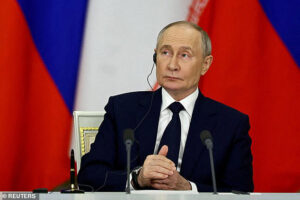
Trump warned on Tuesday that he would likely impose more sanctions on Russia if President Vladimir Putin refused to negotiate to end the nearly three-year-old conflict
After months of Ukraine occupying parts of Russia’s Kursk region as it aims to improve its position in the event of talks, Zelensky stated that any dialogue could only go ahead with Kyiv in a position of strength.
‘Putin cannot be treated as legitimate in this situation. He has violated everything. He must understand his transgression,’ the Ukrainian president said today, adding that if Putin was ‘approached as an equal – that would be a loss for Ukraine.’
But, he said, his government’s top priority was to find a way to halt the war, which has claimed the lives of at least 43,000 Ukrainian soldiers, according to figures released by Ukraine in December.
‘We must find all possible ways to end the hot phase of the war. This is the number one issue,’ Zelensky said.
‘There can be many talks, but the main goal is to stop the active phase. This is the first guarantee of security.’
Russia has occupied Crimea since its 2014 invasion of the territory. Months later it took large parts of the Donbas region, launching a was under the guise of a separatist uprising.
Since the full-scale invasion in 2022, Russian forces have controlled large swathes of southern and eastern Ukraine.
Meanwhile, since a surprise attack in August, Kyiv’s forces occupy around 600 sq km of Russian territory.

Nigerian woman cries out after allegedly being brut@lised by her husband for ‘wearing singlet to take their children to school’

Niger Explosion: Governance must prioritize human lives through proactive policies – Peter Obi

What Speed Darlington posted on Instagram after release from prolonged detention
Trending
- Politics11 months ago
Nigerian Senate passes Bill seeking the establishment of the South East Development Commission.

 Business11 months ago
Business11 months agoInflation hits record high of 29.90% on naira weakness

 Politics8 months ago
Politics8 months agoBREAKING: Federal Gov’t Offers To Pay Above N60,000, Reaches Agreement With Labour

 SportsNews11 months ago
SportsNews11 months agoOlympic Qualifiers 2024: CAF Confirms Dates For Super Falcons Vs Banyana Banyana

 Trending3 months ago
Trending3 months agoNYA demands release of ‘abducted’ Imo chairman, preaches good governance
- Business3 months ago
US court acquits Air Peace boss, slams Mayfield $4000 fine

 Politics3 months ago
Politics3 months agoMexico’s new president causes concern just weeks before the US elections

 Politics11 months ago
Politics11 months agoGovernor Hope Uzodinma’s New Cabinet In Imo: The Gainers, The Losers

